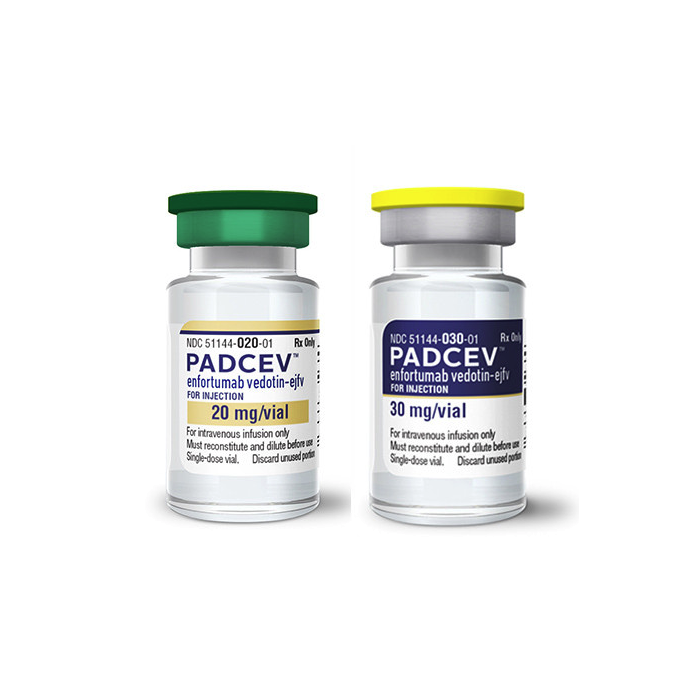Padcev (enfortumab vedotin-ejfv)
We can help with your prescription. Read the “Prescription Guide”.
You can access this medicine even if it's not approved in your country. Learn how.
Disease Indications
Urothelial Carcinoma
Manufacturer
Astellas Pharma Inc.
Usage
Intravenous
Medicine approved by
-
Food and Drug Administration (FDA)

Patients helped
- Over 1.2 million patients reached

- More than 11,000 patients helped

- 100% successful deliveries to 88 countries

We can help with your import documents
We are experts in import regulations. Scroll below to download the import guide for your country.
FREQUENTLY ASKED QUESTIONS
We help you access approved medicines that are not approved or available in your country of residence.
Legal
We help you access approved medicines that are not approved or available in your country of residence.
Legal
Finances
Payment
- Your permanent residence is outside the European Union
- You take the medicines with you, unused within 90 days after purchase
- You have a full original receipt (which we provide you)
Unfortunately, we are unable to help with VAT refunds following delivery or collection from our partner pharmacies outside of the Netherlands.
- If you are residing within the European Union and you are not a company
- If you are coming to Amsterdam, Luxembourg or Dusseldorf to pick up your order
In case of pick up, you may be eligible for a VAT tax refund if you live outside the European Union.
Price
Reimbursement
- That you want to import an approved medicine from abroad
- The lack of reasonable treatment options available in your country (if you can, include a letter from a doctor confirming this) - no alternative to the treatment.
- That the medicine has already been approved in another country (state the name of the country)
- That your treating doctor states that this medicine is the best option for you (include a copy of the prescription in the letter to the healthcare insurance company)
Ordering and shipping
Ordering
- Name of the patient
- Contact details of patient(email and phone number)
- Copy of patient’s ID
- Contact details of the Doctor (name, address, email and phone number)
- Shipping address
- Copy of the doctor's prescription
Shipping: We can deliver to the patient's residence, a pharmacy, or doctor's office / hospital, but this depends on the country. If you’re not sure what the right choice is for you, please get in touch with our Patient Support Team and we can help you work out your exact requirements.
Once we have received this information, one of our Patient Support Team members will then check your prescription and contact you to follow up on your order. Please note that other documents may be needed for import, we will guide you through the ordering process.
Generally not, but we do provide you with an invoice after you make the payment that you may send to your medical insurance company so they can reimburse you. In some limited circumstances, we do accept insurance. Contact us for more details.
As part of our protocols we might reach out to your treating doctor for verification or information updates. By sending us your prescription you allow us to do so.
- Patient's name and date of birth
- Name of the medicine and dosage
- Required quantity
- Doctor's name and signature
- Doctor's registration number and/or stamp
Ideally, the prescription should be issued in English. Alternatively, a translation (unofficial is sufficient) must be provided.
Please be aware that your doctor may be contacted by one of our team members or by the processing pharmacy in order to verify the prescription.
Shipping
Please be aware that due to the COVID-19 situation worldwide and the country lockdowns, we will sometimes experience delays in shipping.
For EMA approved medicines with prescriptions from within the Schengen zone, you can pick the medicines up from our partner pharmacy in Amsterdam, Luxembourg or Dusseldorf. For non-EMA approved medicines, with prescriptions from within the Schengen zone, you can pick the medicines up in our partner pharmacy in Dusseldorf. If you have requested to collect your medicines, you will receive a notification when the medicines are in the pharmacy and ready for you.
There are also options to deliver the medicines to other countries. Please get in touch with our Patient Support Team to discuss which other pick-up and delivery options may be suitable for you.
- Copy of the ID/passport of the patient
- Copy of the ID/passport of the person who is coming to pick up the medicines
- Letter signed by the patient stating that he/she authorises this person to pick up the medicines on his/her behalf
- Step 1 - Customs may need to check the package to verify its contents. In order to streamline this step, we include a letter for customs with information about the contents. Any additional questions will be answered by everyone.org as and when we are contacted by customs.
- Step 2 - In some countries, there are additional questions from the medical regulatory agencies (i.e. the FDA, EMA, etc). We provide them with all the necessary information based on the information provided by the patient, such as: the prescription, copy of ID and a letter from the treating doctor to show that the medicines are for personal use.
- Step 3 - Customs fees. In some cases, the recipient will be requested to pay taxes and duties. These should be arranged by the patient or receiver and are not covered by everyone.org unless stated otherwise.
Please be aware that the import of the medicines always requires customs clearance and active cooperation from the importing party. We will help and guide you but are dependent on your cooperation and responsiveness.
About us
- Complete the enquiry form on our Contact Us page
- Send an email: [email protected]
- Call us on:
- +31 20 808 4414 (EU)
- +1 646 381 0675 (US)
- +61 28 417 2910 (AUS)
Others
Available medicines
Medicine approval
The respective national and regional agencies, such as the Food and Drugs Administration (FDA) in the USA or the European Medical Authority (EMA) for the European Union assess these applications and make a decision on whether to approve new medicines. The review process is based on evaluation of the evidence provided by the company. Every agency uses a slightly different process.
- Phase I - performed in a small number of healthy volunteers or very sick patients with lack of treatment options, designed to study the effects of the medicine in the human body.
- Phase II - larger number of patients, designed to evaluate the safety and efficacy of the medicine and to determine if different dosages of the treatment have different effects.
- Phase III - large number of patient groups, designed to confirm the safety and efficacy of the medicine.
- Phase IV - after the medicine has received regulatory approval, designed to evaluate the long-term effects.
Updates
Finances
Payment
- Your permanent residence is outside the European Union
- You take the medicines with you, unused within 90 days after purchase
- You have a full original receipt (which we provide you)
Unfortunately, we are unable to help with VAT refunds following delivery or collection from our partner pharmacies outside of the Netherlands.
- If you are residing within the European Union and you are not a company
- If you are coming to Amsterdam, Luxembourg or Dusseldorf to pick up your order
In case of pick up, you may be eligible for a VAT tax refund if you live outside the European Union.
Price
Reimbursement
- That you want to import an approved medicine from abroad
- The lack of reasonable treatment options available in your country (if you can, include a letter from a doctor confirming this) - no alternative to the treatment.
- That the medicine has already been approved in another country (state the name of the country)
- That your treating doctor states that this medicine is the best option for you (include a copy of the prescription in the letter to the healthcare insurance company)
Ordering and shipping
Ordering
- Name of the patient
- Contact details of patient(email and phone number)
- Copy of patient’s ID
- Contact details of the Doctor (name, address, email and phone number)
- Shipping address
- Copy of the doctor's prescription
Shipping: We can deliver to the patient's residence, a pharmacy, or doctor's office / hospital, but this depends on the country. If you’re not sure what the right choice is for you, please get in touch with our Patient Support Team and we can help you work out your exact requirements.
Once we have received this information, one of our Patient Support Team members will then check your prescription and contact you to follow up on your order. Please note that other documents may be needed for import, we will guide you through the ordering process.
Generally not, but we do provide you with an invoice after you make the payment that you may send to your medical insurance company so they can reimburse you. In some limited circumstances, we do accept insurance. Contact us for more details.
As part of our protocols we might reach out to your treating doctor for verification or information updates. By sending us your prescription you allow us to do so.
- Patient's name and date of birth
- Name of the medicine and dosage
- Required quantity
- Doctor's name and signature
- Doctor's registration number and/or stamp
Ideally, the prescription should be issued in English. Alternatively, a translation (unofficial is sufficient) must be provided.
Please be aware that your doctor may be contacted by one of our team members or by the processing pharmacy in order to verify the prescription.
Shipping
Please be aware that due to the COVID-19 situation worldwide and the country lockdowns, we will sometimes experience delays in shipping.
For EMA approved medicines with prescriptions from within the Schengen zone, you can pick the medicines up from our partner pharmacy in Amsterdam, Luxembourg or Dusseldorf. For non-EMA approved medicines, with prescriptions from within the Schengen zone, you can pick the medicines up in our partner pharmacy in Dusseldorf. If you have requested to collect your medicines, you will receive a notification when the medicines are in the pharmacy and ready for you.
There are also options to deliver the medicines to other countries. Please get in touch with our Patient Support Team to discuss which other pick-up and delivery options may be suitable for you.
- Copy of the ID/passport of the patient
- Copy of the ID/passport of the person who is coming to pick up the medicines
- Letter signed by the patient stating that he/she authorises this person to pick up the medicines on his/her behalf
- Step 1 - Customs may need to check the package to verify its contents. In order to streamline this step, we include a letter for customs with information about the contents. Any additional questions will be answered by everyone.org as and when we are contacted by customs.
- Step 2 - In some countries, there are additional questions from the medical regulatory agencies (i.e. the FDA, EMA, etc). We provide them with all the necessary information based on the information provided by the patient, such as: the prescription, copy of ID and a letter from the treating doctor to show that the medicines are for personal use.
- Step 3 - Customs fees. In some cases, the recipient will be requested to pay taxes and duties. These should be arranged by the patient or receiver and are not covered by everyone.org unless stated otherwise.
Please be aware that the import of the medicines always requires customs clearance and active cooperation from the importing party. We will help and guide you but are dependent on your cooperation and responsiveness.
About us
- Complete the enquiry form on our Contact Us page
- Send an email: [email protected]
- Call us on:
- +31 20 808 4414 (EU)
- +1 646 381 0675 (US)
- +61 28 417 2910 (AUS)
Others
Available medicines
Medicine approval
The respective national and regional agencies, such as the Food and Drugs Administration (FDA) in the USA or the European Medical Authority (EMA) for the European Union assess these applications and make a decision on whether to approve new medicines. The review process is based on evaluation of the evidence provided by the company. Every agency uses a slightly different process.
- Phase I - performed in a small number of healthy volunteers or very sick patients with lack of treatment options, designed to study the effects of the medicine in the human body.
- Phase II - larger number of patients, designed to evaluate the safety and efficacy of the medicine and to determine if different dosages of the treatment have different effects.
- Phase III - large number of patient groups, designed to confirm the safety and efficacy of the medicine.
- Phase IV - after the medicine has received regulatory approval, designed to evaluate the long-term effects.
Updates
GDP compliant. View certificate.
Licensed wholesale distributor. View certificate.
Patient reviews
“I want to recommend everyone to work with this organization. They are reliable, honest, punctual and do everything to meet your needs…”
“Dr. Aysen Simsek and her team offered assistance during a very difficult time. I truly appreciate their quick, efficient and professional attitude, as well as their patience and superb customer service…”
“I highly recommend everyone.org. They welcomed me with open arms when I went to their office in Amsterdam. I was in a very difficult situation with a tight schedule, and their amazing team members…”
Looking for more information? Download your free guide on: “How to import a medicine”.
Select your preferred country and input your email to receive a step by step guide on how we can help you legally and safely import a medicine that is not approved in your country.


Thank you!
You will receive an email with a download link to your guide (or a confirmation if you selected Other) at [email protected]. Please check your spam or junk folder.
Back to pageContact Patient Support
If you have any questions or need any help, contact our Patient Support Team. We will get in touch with you within 24 hours from Monday to Friday between 9:00 and 18:00 CET.
Call
+31 20 808 4414About us
We are everyone.org. We help you access elsewhere approved medicines, no matter where you live. To date, we have assisted patients in over 88 countries to access thousands of life-improving medicines.
Learn moreAbout us
Compare medicines by category
Disclaimer
Every effort has been made to ensure that the information provided here is accurate, up-to-date and complete, but no guarantee is made to that effect. Medicine information contained herein may be time sensitive. The absence of a warning for a given medicine or combination thereof in no way should be construed to indicate that the medicine or combination is safe, effective or appropriate for any given patient. Always consult your treating physician before starting a course of treatment.



































